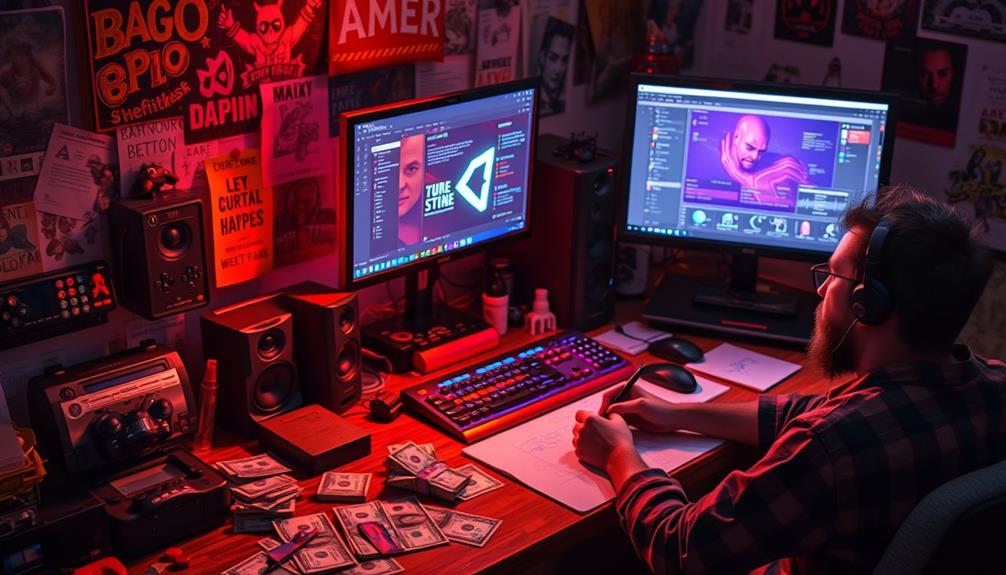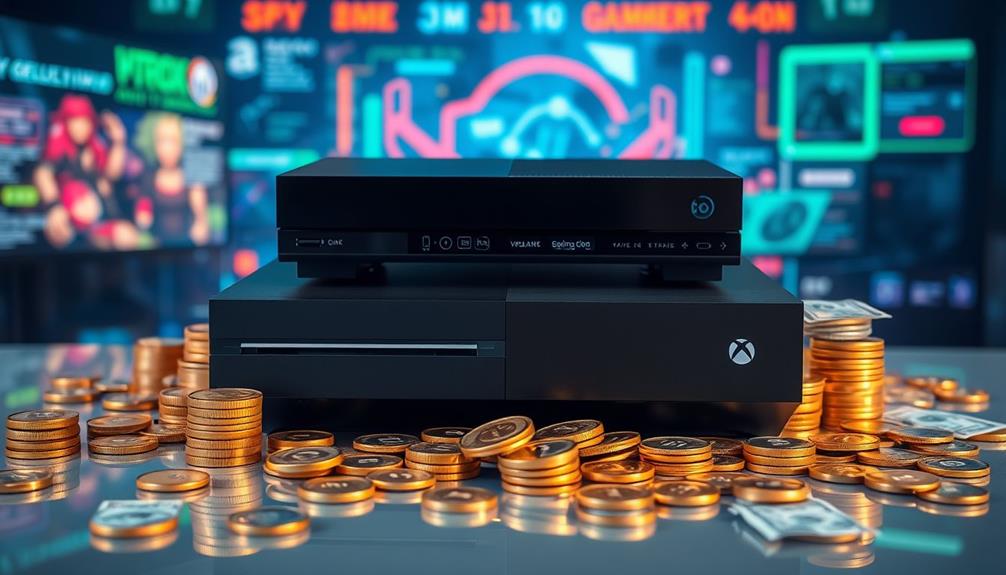You can absolutely make money with Unity Free, but it depends on your game's quality and how well you market it. Many developers have seen success, just like the indie game "Thomas Was Alone." You'll need to evaluate various revenue streams, from in-app purchases to ads, as relying solely on the Unity Asset Store can be risky. While you can start without upfront costs, remember that hidden expenses like asset creation and marketing will arise. Understanding market trends and continuously innovating will help you succeed. There's so much more to explore about maximizing your earnings potential.
Key Takeaways
- Unity Free allows developers to create and release games without upfront costs, making it accessible for indie studios with limited budgets.
- Earnings can vary widely, with potential monthly income ranging from $30 to $1,000-$2,000 after Unity's cut, but long-term earnings often stabilize around $30.
- Success depends on asset quality and uniqueness; continuous innovation is crucial in a saturated market to maintain player engagement and satisfaction.
- Diversifying revenue streams beyond the asset store, such as sponsorships and in-app purchases, is essential for financial stability and growth.
- Community engagement and market research play vital roles in maximizing earnings, helping developers understand trends and player preferences.
Understanding Unity License Types
When you're diving into game development with Unity, it's important to understand the different license types available to you. One of the most attractive options is Unity Free, which is perfect for developers and entities with annual gross revenues under $100,000.
With Unity Free, you can create and release your games without incurring any licensing fees, making it an ideal starting point for many aspiring developers. Additionally, managing your budget effectively during the development process is significant to make sure that you can sustain your project without overspending on resources a personal budget.
However, if your total income surpasses that $100,000 threshold, you must upgrade to Unity Pro to stay compliant with licensing terms. Unity Pro not only helps you avoid legal pitfalls but also offers advanced features like enhanced graphical capabilities and the option to remove the default splash screen—beneficial for projects aiming for a professional polish.
Understanding Unity license types is important to make certain you accurately assess your total earnings and report them correctly. Misunderstandings in income reporting can lead to serious legal implications, so it's imperative to familiarize yourself with Unity's licensing agreements.
Potential Earnings With Unity Free
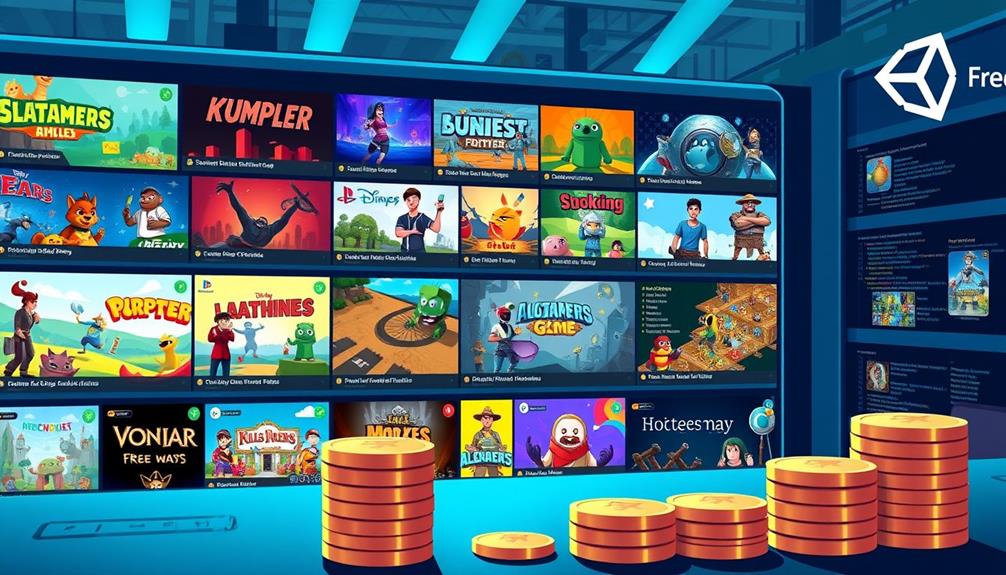
Earning potential with Unity Free can vary considerably among developers, making it essential to understand the landscape of income opportunities. While some developers might make as little as $30 a month, others report earning between $1,000 and $2,000 after Unity's 30% cut.
Platforms like best websites to earn money online can provide additional avenues for income through freelance and asset sales. Featured sales on the Unity Asset Store can provide a significant boost, with some publishers earning $5,000 to $9,000 in a single month during promotional events.
However, it's crucial to recognize that initial hype can lead to high sales, but many developers experience a decline afterward. For instance, one publisher saw their earnings plummet from $1,500 to just $30 monthly after the initial surge.
Long-term earnings often stabilize around $30, depending on the usefulness and uniqueness of the assets you create, as well as market demand.
To truly make money in this arena, you'll need to continuously develop new and unique assets to maintain your sales momentum and stand out in a saturated market. Your success hinges on your ability to innovate and respond to what buyers are looking for.
Key Factors Affecting Revenue
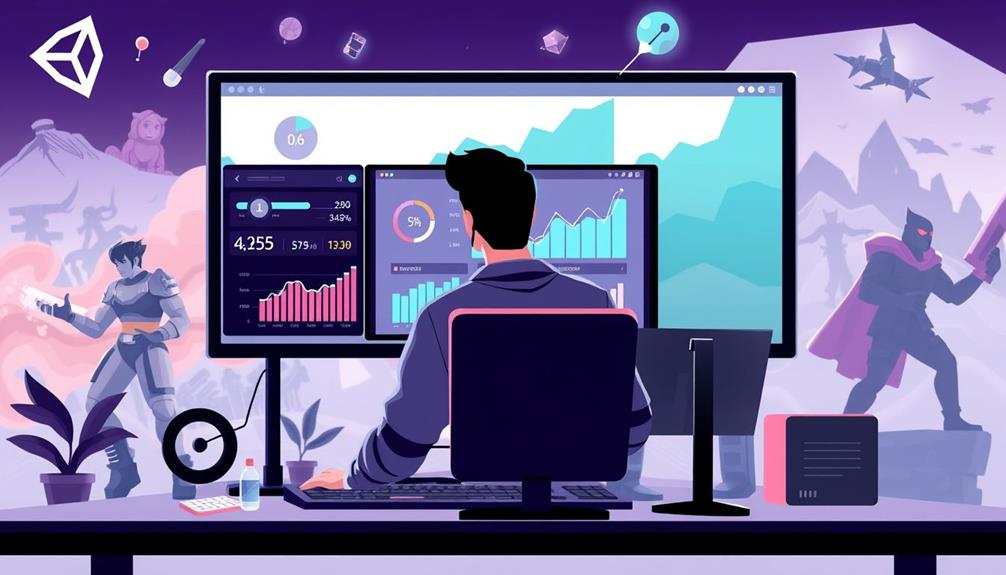
Several key factors influence your revenue potential when working with Unity Free. First, the initial hype around your games can lead to notable spikes in earnings, especially during featured sales. Some developers report monthly revenues soaring to $5,000 or even $9,000, but be aware that these figures can quickly drop to around $30 once the initial excitement fades.
The quality and uniqueness of the assets you create are vital in a saturated market, much like how the themes of positivity and warmth in a song can resonate with an audience. To successfully make assets and sell them, you need to stand out from the competition. Continuous innovation is essential; the market can become crowded with similar offerings, so regularly introducing new and high-quality assets helps maintain sales momentum.
Additionally, long-term profitability hinges on how useful your assets are and your commitment to providing ongoing support and updates. While this can be time-consuming, it ultimately impacts your potential earnings.
Transitioning to Unity Pro
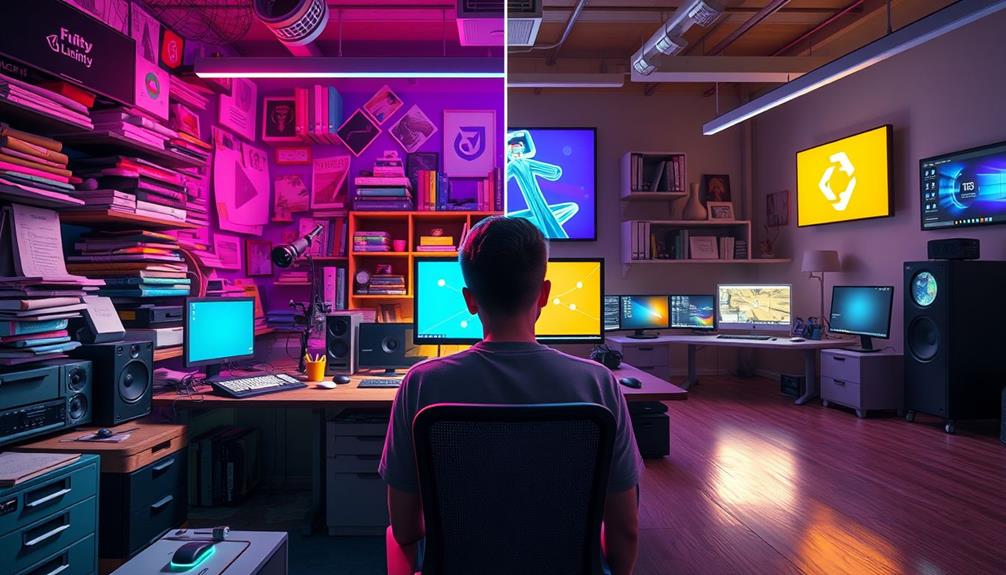
As your game development journey progresses, you might find that upgrading to Unity Pro is essential for maximizing your potential.
This shift not only opens advanced features that enhance your game's quality but also guarantees you stay compliant with licensing requirements.
Additionally, high-quality content boosts credibility and can greatly impact your game's success in a competitive market.
Let's explore the benefits of upgrading, the cost analysis, and the legal implications of your choices.
Benefits of Upgrading
Upgrading to Unity Pro is often a smart move for developers who start seeing considerable returns on their games. When your game revenue exceeds $100,000, the cost of the Unity Pro license becomes negligible compared to your potential earnings.
In today's competitive digital landscape, embracing creativity and innovation is essential for success, as highlighted by the importance of nurturing an imaginative mindset.
Here are some key benefits of upgrading to Unity Pro:
- Enhanced Graphical Capabilities: Access advanced graphics features that can elevate your game's visual quality.
- No Default Splash Screen: Remove the Unity splash screen for a more professional presentation of your game.
- Additional Tools: Utilize tools like Image Effects and Level of Detail (LoD) systems to improve gameplay and performance.
- Improved Marketability: With professional features, you can make your game stand out in a competitive market, attracting more players.
- Legal Compliance: Upgrading guarantees you meet Unity's licensing terms, avoiding potential legal issues and court costs.
Many successful developers began with Unity Free but shifted to Unity Pro as their projects gained traction.
Cost Analysis Comparison
Shifting from Unity Free to Unity Pro can be a pivotal decision for developers looking to maximize their game's earnings. When your game begins raking in revenues exceeding $100,000, the cost of Unity Pro becomes minimal compared to the potential profits you can make.
The enhanced graphical features and advanced tools in Pro can greatly elevate your game's quality, making it more appealing to players and increasing your chances of success in a competitive market. This aligns with the principles of economic theory that support resource allocation efficiency, where investing in quality can lead to greater returns.
Moreover, removing the default Unity splash screen in Pro gives your game a more professional look, which can boost player engagement and ultimately lead to higher sales.
While Unity Free offers essential tools for getting started, moving to Pro is geared towards serious developers like you who want to take their projects to the next level.
Many successful titles that began with Unity Free have later upgraded to Pro after generating considerable income, underscoring the financial wisdom of this shift.
If you're serious about making money using Unity, weighing the costs and benefits of upgrading to Pro is essential for your game's long-term success.
Legal Compliance Considerations
Changing to Unity Pro becomes necessary once your game exceeds the $100,000 annual gross revenue threshold while using Unity Free. Failing to make this change can lead to serious legal compliance issues.
To avoid potential legal ramifications, consider these key points:
- Upgrade to Unity Pro: This license removes revenue limitations, allowing you to grow your business without restrictions. Additionally, exploring educational resources can help you make informed decisions about your upgrade.
- Accurate Income Reporting: Be diligent in reporting your total income from all sources, as misunderstandings can lead to complications.
- Consult Legal Guidance: When moving to a paid version, it's wise to seek legal advice to guarantee your business structure aligns with Unity's requirements.
- Understand Licensing Obligations: Familiarize yourself with Unity's licensing terms to avoid any unintentional violations.
- Mitigate Risks: Upgrading to Unity Pro isn't just about compliance; it also enhances your game with advanced features that improve quality.
Community Insights and Experiences

In recent years, many developers have taken to Unity Free as a viable platform for game development, sharing their insights and experiences within the community. This open-source environment has proven to be particularly beneficial for indie studios that want to create mobile and browser games without upfront costs.
Many developers have successfully launched projects, showcasing the platform's capabilities and the potential for AI-Powered Virtual Reality in E-Learning to enhance game development. Community discussions reveal a wide range of earnings, with some developers earning modest amounts while others report significant monthly profits. Your success often hinges on factors like asset quality and market demand.
Misunderstandings about Unity's licensing terms are common, but community members frequently clarify income reporting and compliance issues for users of the free version. Notable projects, such as "Thomas Was Alone," illustrate the potential of Unity Free, allowing developers to build portfolios and gain valuable experience.
The community emphasizes creativity and the development of unique assets, suggesting that a compelling game concept can lead to success, regardless of your licensing tier. By engaging with these insights and experiences, you can better navigate the landscape of Unity Free and maximize your chances of making money in game development.
Best Practices for Game Development
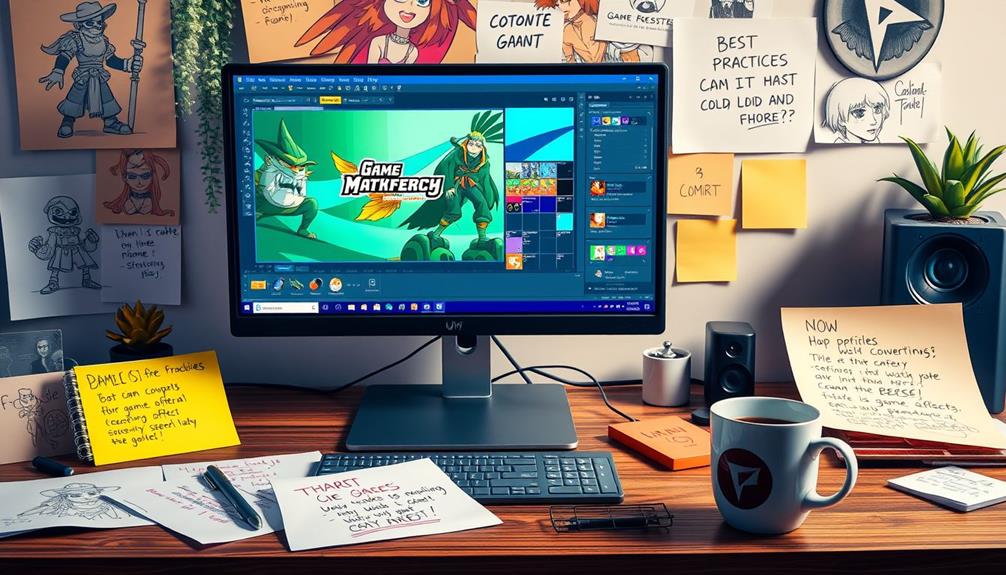
When you're developing a game, effective prototyping techniques can help you test ideas quickly and efficiently.
Embracing the transformative power of curiosity can lead to innovative solutions and fresh perspectives on game design.
Remember, asset quality matters; players notice the difference between polished visuals and rough designs.
Effective Prototyping Techniques
Prototyping effectively is essential for any game developer looking to refine their ideas and engage players early on. Rapid prototyping lets you assess core gameplay mechanics quickly, helping you gauge player interest before committing significant time and resources.
Incorporating elements like glycolic acid benefits in your game's aesthetic can enhance user engagement and create a more immersive experience. Here are some best practices to keep in mind:
- Engage diverse testers: Involve a variety of players to gather thorough feedback on gameplay, ensuring you capture multiple perspectives.
- Leverage online platforms: Use sites like Itch.io and Gamejolt to share your prototypes. This gives you valuable insights into market trends and player preferences.
- Showcase your vision: Create engaging prototypes that highlight gameplay and art direction, generating buzz and potentially attracting publishers.
- Iterate continuously: Use player feedback and engagement metrics to refine your prototypes, enhancing gameplay quality iteratively.
- Stay flexible: Be open to changing your ideas based on player responses, as this can lead to a more resonant final product.
Asset Quality Matters
Quality assets are crucial for game development, as they directly impact player engagement and satisfaction. When you're using the free version of Unity, focusing on asset quality becomes even more important. High-quality assets not only enhance the gaming experience but also tend to sell better in competitive markets, boosting your profitability.
Investing time in creating well-documented assets is another best practice. Developers appreciate clear guidance, which improves user experience and encourages repeat purchases. Remember, the initial hype around asset launches often fades, so it's essential to prioritize long-term quality and usefulness to keep your sales consistent.
Moreover, continuously updating and providing support for your assets can greatly enhance customer retention. By staying engaged with your user base, you create a reliable income stream.
Collaborating with other developers and participating in community forums can also offer valuable insights into market needs and best practices. This way, you're refining your asset quality and increasing your chances of success.
In the end, remember that high-quality assets are your ticket to making money with Unity—so don't cut corners!
Market Research Importance
Understanding the importance of market research can make a significant difference in your game development journey. By analyzing existing successful games, you can minimize risks and gain insights into competitive positioning and market trends.
Here are some best practices to take into account:
- Analyze successful games: Identify what makes them appealing to players.
- Utilize platforms like Itch.io and Gamejolt: Gather public feedback to understand player interest and refine game mechanics.
- Create short gameplay videos: Produce 30-second clips to capture interest and assess engagement metrics for potential profitability.
- Balance trends with originality: While it's tempting to follow market trends for quick wins, unique ideas often resonate more in crowded markets.
- Seek honest feedback: Use neutral testers to get accurate assessments of your gameplay mechanics and improve overall quality.
Branding and Market Perception
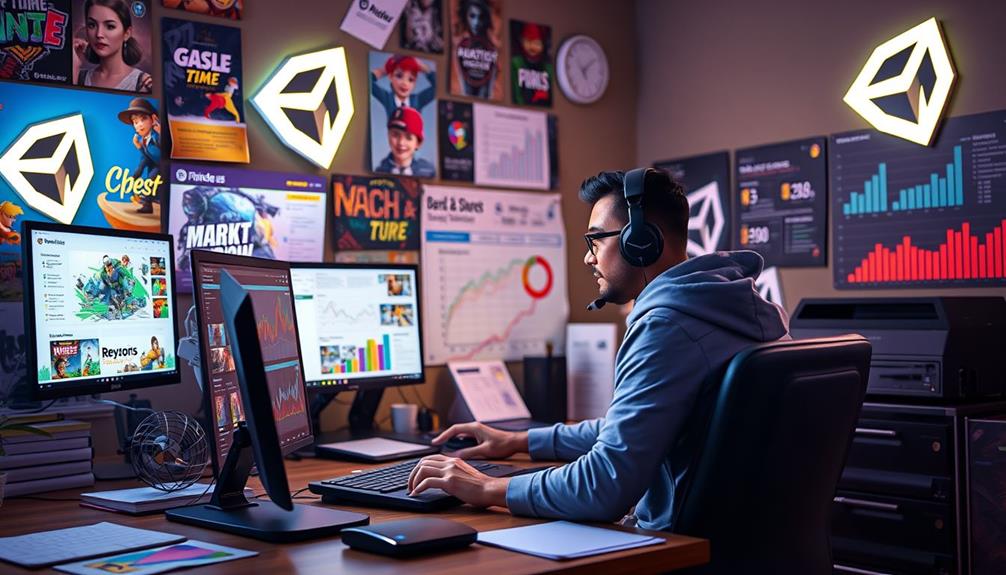
When you launch a game made with Unity's free version, the branding associated with it can greatly influence how players perceive your creation. Unfortunately, the Unity splash screen often carries a negative connotation, making players think your game might be of lower quality. This perception can deter potential downloads and reduce player engagement, especially when compared to titles that lack the Unity logo.
Many gamers associate the Unity brand with less polished experiences, which can create unfair biases against your hard work. Some developers suggest changing the splash screen to read "Made with Inform7" to elevate the brand perception and differentiate the quality of games produced. This could encourage players to approach your game with an open mind, free from preconceived notions.
Moreover, the current licensing allows free users to display the Unity logo, but many believe that exclusive branding for Pro users could enhance the overall perception of game quality. Calls for a more visually appealing splash screen reflect a desire to align better with player expectations and improve the gaming experience.
Ultimately, how you navigate branding can markedly impact your game's success in a competitive market.
Long-Term Success Strategies
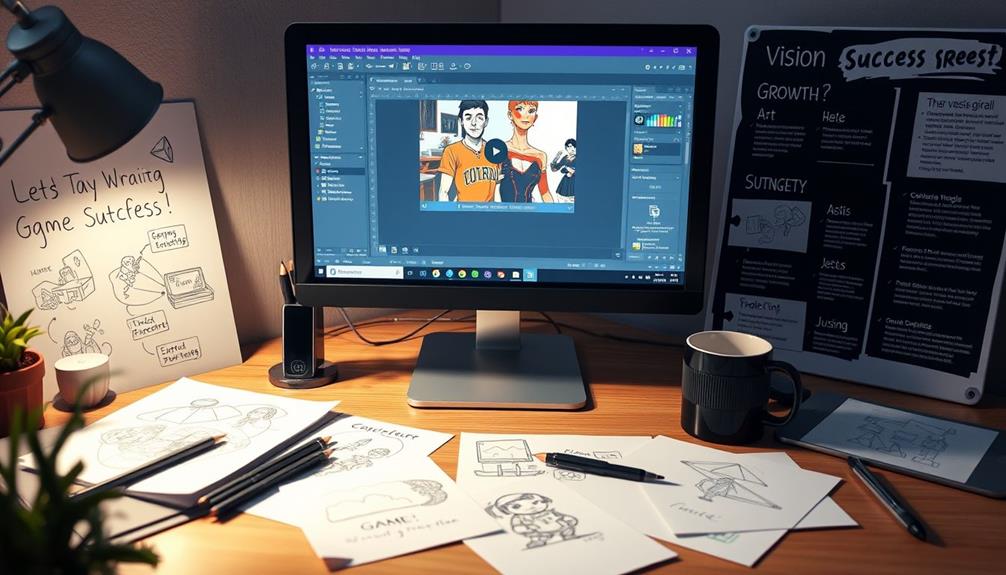
Achieving long-term success in game development requires a strategic approach that goes beyond just creating a great game.
To truly thrive, you need to focus on several key strategies:
- Innovate Continuously: Develop unique offerings to stand out in a saturated market.
- Engage with the Community: Participate in forums and network with other developers for insights and support.
- Maintain Financial Records: Keep detailed financial records to understand your income and stay compliant with licensing obligations, especially regarding Unity's income thresholds.
- Diversify Income Sources: Avoid relying solely on the asset store. Explore other revenue streams for financial stability.
- Test Prototypes Regularly: Gather feedback from diverse groups to refine gameplay mechanics and gauge market interest before launching full projects.
Conclusion
To sum up, while you can definitely start your game development journey with Unity Free, your potential for profit largely hinges on your skills, creativity, and strategy. Are you ready to invest the time and effort needed to stand out in a crowded market? By leveraging community insights and adhering to best practices, you can pave your way to success. Remember, it's not just about the tools you use; it's about how you use them to turn your vision into reality!
